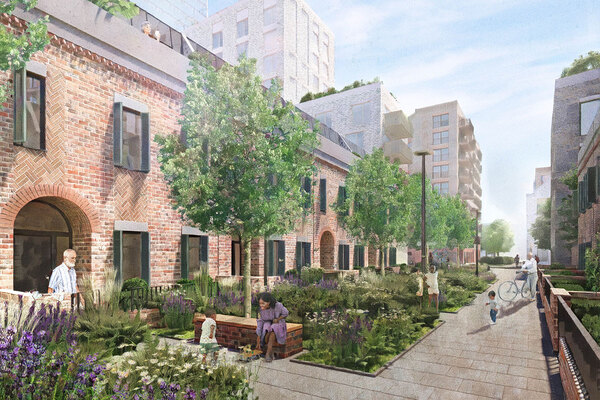You are viewing 1 of your 1 free articles
Estate regenerations failed to replace social homes due to cross-subsidy model, NHF boss says
Estate regeneration projects in London failed to replace social homes because they were not funded enough by the government, the chief executive of the National Housing Federation (NHF) has said.

Kate Henderson explained that developers were expected to rely on the cross-subsidy model to fund their regeneration schemes, which led to a net loss of social housing.
Ms Henderson was addressing a panel event at the Housing Community Summit in Liverpool on Tuesday.
She said: “The real issue that happened with estate regeneration in London is it was not funded enough by the state, so it relied on cross-subsidy, which could never, ever do the replacement social housing.
“Therefore, you had a change of tenure on those sites, a net loss of social housing on many of those sites, and people were understandably really upset by that.”
Ms Henderson added that she did not think “we’ve had a strong strategy or steer” from the new government on estate regeneration. She also pointed out that “there are a lot of new Labour MPs for areas that maybe need renewal and regeneration”.
“I think we should hear more from the government specifically on estate regeneration, and that’s something we should be offering and asking for,” she continued.
“A lot of our homes are coming to the end of their lifetime… Many of those sites could increase the density as well. But we’re not going to be able to do it all with cross-subsidy, especially in a down-turning market.”
Fellow panellist Mark Washer, chief executive of Sovereign Network Group, said that “a reasonably significant element” of his housing association’s development target represented replacement of existing homes through regeneration.
He said: “We will all, as housing associations, have estates that at the very least have seen better times but in some cases are in urgent need of renewal.
“It doesn’t always mean that the people don’t want to live in them; it doesn’t always mean that all of the homes on those estates are failing.
“But we have to accept that there are significant numbers of homes that need renewal, demolition and rebuilding, and we have to be making that case to government.”
Mr Washer also urged ministers to support town centre regeneration, warning that focusing on building new urban extensions on the edge of towns could “leave you with a hollowed-out doughnut”.
In a separate panel at the conference on Tuesday, Labour MP Paula Barker called for a wider roll-out of the Housing First scheme to support rough sleepers.
Ms Barker, who is co-chair of the All-Party Parliamentary Group for Ending Homelessness, told delegates that “we have to invest in this cross-departmental strategy” for homelessness that featured in Labour’s general election manifesto.
“We have to have an ‘invest to save’ initiative,” she said. “We have to have that outlay at the start to be able to save money later on down the line.”
Ministers should take a “trauma-informed and trauma-led approach”, she said. “A lot of the agencies that we deal with and even local authorities, the staff just aren’t trauma-informed trained… so when the person who is homeless presents, they get treated often with disdain.”
Ms Barker also said she would push for the government’s promised 1.5 million new homes to be “a real mix” of private, social and affordable homes.
“I want to see the roll-out of the Housing First project as well,” she said. “There’s a lot to do.”
Earlier in the day, delegates heard from the chief executive of Homes England on why the Affordable Homes Programme is “struggling” to deliver in rural areas.
Sign up for our development and finance newsletter
Already have an account? Click here to manage your newsletters











